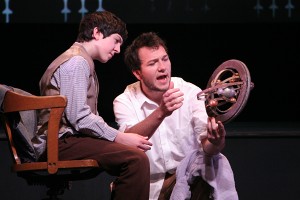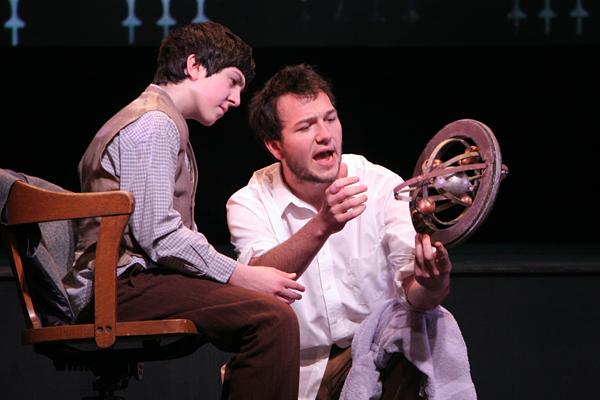
Set in the 1940’s, Brecht’s play takes the audience on a journey from Galileo’s initial invention of his telescope, to his eventual trial by the inquisition and subsequent house arrest. It winds through various locales, from Florence to Rome, and even brings in a carnival complete with singing, dancing, and one character wearing an over-sized mask that resembles a combination of Galileo’s head and a cheeseburger. The production witnessed for the following review was a dress rehearsal two days before opening night.
The visual components of the play, designed by Henry Reich ’09, stand out, adding that little something that makes Galileo leave the realm of the ordinary and reach into the mystical. In Act I, we see Galileo (Ben Finkelstein, ’10) and his friend Sagredo (Eamon Anderson ’09) work out the puzzle of Jupiter’s moons, succeeding in an epic triumph of scientific discovery. It evokes fantasies of sleepless nights discovering the next great breakthroughs in understanding.
The praise for this wonderful scene should be mainly attributed to the lighting, set and sound designers, as well as to Mease. The actors in this scene became props. The stage fills with dramatic lighting, beautiful sound and awesome visual imagery to form the main interest in the scene, all the while Galileo and Sagredo sit in solemn silence, working out the puzzles of the universe.
This scene contrasts other more actor-dominated scenes, where Galileo seems like it could become a great production at any moment, but instead remains just above average. Many actors seemed to approach the daunting task of representing multiple characters by adopting a universally neutral character without any nuanced depth beyond two emotional states: angry and loud, or happy and quiet.
Some actors seemed very excited only to act, say their lines, and feel their emotions. But in this excitement, they lose their characters because they forget that acting is about reacting. Acting is more about the interaction with the other people on stage and with the plot line than it is about the individual actor. When this lesson is forgotten, a two-way monologue between actors takes the place of good dialogue.
Emotions and actions are frequently projected, and lines are often anticipated. At times you could see a character drop his bags before being invited into the house, showing that the actor thought about his next action before the character did.
There are some notable exceptions to this generalization, such as Jaysen Wright ’09 who plays Pope Urban VIII. Wright successfully captures all facets of his character without allowing one to bleed into another, delivering a refreshingly clear and deliberate performance.
Playing the title character, Finkelstein comes through with a solid performance, although one that would come out more in a smaller space than Roberts Theatre. Finkelstein takes the audience on a lengthy and intensive journey from a young and excited Galileo to an old and imprisoned one, upsetting ideal images many may have held onto about Galileo’s personality.
A trying performance for any actor, Finkelstein maintains his character throughout, showing a wide range of emotional depth and understanding. His touching final monologue reveals the true nature of Galileo as a cunning and unforgiving scientist. It falls short of grandeur when the energy at the end sags and words are lost into the cavernous ceiling of Roberts Theatre. Yet, this monologue benefits from quiet tones and internal reflection, so the space here plays the villain in Finkelstein’s performance, not necessarily his vocal qualities.
Still, many other actors have difficulty competing against their environment, be it through sound, the size of Roberts Theatre, or against the background clapping of other actors on stage. At times it is impossible to understand important dialogue between actors because their voices do not project far enough to be carried around the hall.
Finally, it would be nice to see fuller development of characters besides the lead, but they are too often lost in the overwhelming stage presence of Galileo. Nothing develops without him, and the play grinds to a halt when he is not on stage, but that happens rarely.
In all, this lengthy production, roughly three hours, is aptly suited for a Grinnell audience that can get excited by dialogue interspersed with Latin and scientific reasoning, and chalk full of thought-provoking and motivating discussions on the truth of religious philosophy and the power of science.
Be prepared to think, feel sad, and possibly become disillusioned with your preexisting image of Galileo. This is not an uplifting, feel good production, but it is an excellent one. So take the time, get away from your midsems, and delight in some realistic scientific discovery.




















































Mark Finkelstein • Mar 9, 2009 at 3:04 pm
Great work, Ben! That thing in your hand in the S&B picture looks a bit like items in your room after your young cousins have “visited”. Go Pioneers!
Mark Finkelstein
Proud Uncle
Grinnell ’82